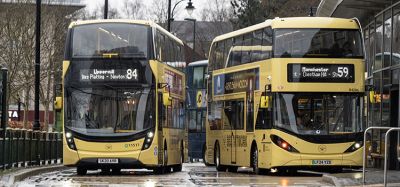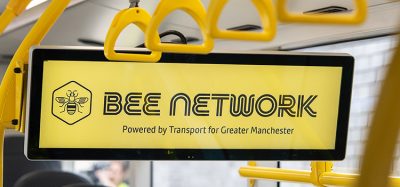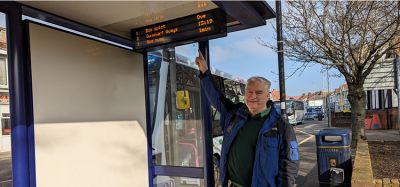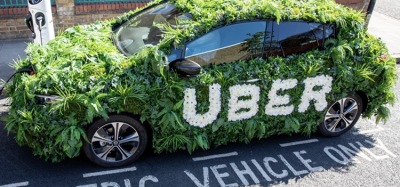Innovation drives growth strategy for Arriva UK Bus
- Like
- Digg
- Del
- Tumblr
- VKontakte
- Buffer
- Love This
- Odnoklassniki
- Meneame
- Blogger
- Amazon
- Yahoo Mail
- Gmail
- AOL
- Newsvine
- HackerNews
- Evernote
- MySpace
- Mail.ru
- Viadeo
- Line
- Comments
- Yummly
- SMS
- Viber
- Telegram
- Subscribe
- Skype
- Facebook Messenger
- Kakao
- LiveJournal
- Yammer
- Edgar
- Fintel
- Mix
- Instapaper
- Copy Link
Posted: 6 May 2015 | Mark Yexley, Operations and Commercial Director for Arriva UK Bus
Driven by a desire to challenge perception of bus travel and deliver smoother customer journeys, Arriva UK Bus is committed to growing its market share by remaining innovative in its approach to business. From the conception of the customer-feedback inspired premium Sapphire brand, to the launch of the bus industry’s first fully-national travel app featuring real-time information, Arriva is not afraid to push boundaries to stay ahead of the curve. It’s a truly multi-faceted strategy which has already proved advantageous not only for Arriva’s bottom line, but for customers and staff alike. Here, Mark Yexley, Operations and Commercial Director for Arriva UK Bus, discusses how innovation has informed the success of operations at Arriva and set the benchmark for the future…
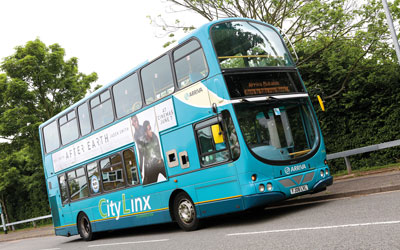

Keeping mobile
We are proud to have pioneered mobile technology within the bus industry, becoming the first bus company to launch a national mobile ticket app back in 2009, with more than 20 million journeys made since, but we recognise that both technology and our customer’s expectations of it change rapidly. As such, remaining on top of what technology can achieve, and how we can integrate it into our business is key to delivering a multitude of efficiencies for our business.
For us, any technology which will engage with our customers and make bus usage easier and more accessible for them is worth exploring.
The mobile travel app that we launched last year, for example, was our way of taking the hassle and angst out of bus travel, by putting all route, service and timetable information directly at the fingertips of our customers. The live maps and real-time information (RTI) are designed to enable bus users to plan their journeys more effectively, and give them back valuable ‘me-time’ by keeping them informed. And it works. We’ve now had well over half a million downloads, with two thirds of users accessing the information regularly, meaning that many of our customers are now enjoying easier, more efficient travel. The question now is: how can we continue to build on this? Incorporating single A to B fares will almost certainly be the first stage of evolution for the app, but there are a number of other possibilities too – if it benefits our customers, we’ll consider it.
Social inclusion is incredibly important for us and maximising the capabilities of technology affords us the flexibility to engage with our customers in the way that best suits them. For example, our revamped m-ticket which became available in early-2015 works for the more mobile-savvy generation who want ease and convenience when buying tickets without the hassle of searching for change, or carrying around a travel pass. It offers a much more streamlined purchasing, activation and usage process than our previous m-ticket, with a modern styling and user interface, but is by no means at the end of the road in terms of what can be achieved with it. We’re already in talks to progress account-based auto redemption, effectively taking the driver out of the equation, and taking us one step closer to a cashless system.
But then there are those who are still a little distrusting of the security of m-commerce and prefer to buy online then have a pass either delivered to their door or pushed to mobile. We appreciate that this is the case, so are constantly looking to develop cleaner, easier, methods of online purchase, with less click-throughs, to help tackle basket abandonment. We’d of course much prefer either of these methods of payment, as collating the purchase data helps inform our customer profiling, which in turn makes us more aware of areas for development, and ensures we send targeted communications to our customers to ensure relevancy. But the matter of payment is still very much a ‘horses for courses’ issue. We are as keen not to discriminate against those wanting paying cash on-board, but perhaps help to make their lives easier by developing a full remit of tools which might facilitate behavioural change.
Smartcards are the most logical next-step, as it very much fills the gap in the market for cashless payment without taking cash-payers too far out of their comfort zone by pushing them online or to mobile. All our ticket machines are already smartcard-enabled and it is a technology that has already been successfully implemented in specific UK towns and cities, so there is no reason we won’t have several more commercial schemes up and running during 2015, be it Arriva only, or multi-operator, putting us firmly in the driving seat for strengthening payment provisions for our customers through innovative use of technology.
Going green
We are asked frequently ‘what is Arriva UK Bus doing to help the environment?’ People make millions of journeys each year by bus, which is inherently good for the environment, not to mention making best use of scarce space on the roads, but we need to ensure we are doing everything we can to green the fleet and make the process more efficient.
We need 170 million litres of diesel each year for our 5,500 buses and, unsurprisingly, we have concentrated on shrinking that figure both to reduce our carbon footprint and to save money. This then guarantees that our initiatives are not just one-off gimmicks, but have become part of our routine permanently.
It starts with seeking out the most fuel efficient buses we can. We are happy to pay a higher price for bus types which will give us greater fuel savings over the years we own them, compared with others which might be cheaper to buy originally. We have worked closely with the manufacturers in helping them to develop fuel efficient buses and, most recently, we have paid extra for fuel efficiency technology to be fitted to all the new single-deck buses we have put into the fleet. These work by either having special gearboxes which are designed to minimise fuel consumption, or have a micro-hybrid kit fitted which harvests the energy generated by braking and then feeds it back into powering up the heaters, windscreen wipers and lights of the bus. In addition we have begun fitting all our new buses with start/stop technology – all of which adds up to some astoundingly good consumption figures.
Alongside this, we have invested approximately £22.2 million in the implementation of green-fuelled vehicles across the UK, with an additional £4.5 million funding provided by the Department for Transport’s Green Bus Fund. This has facilitated 24 buses which run on gas created by rotting vegetable and crop waste going into operation in Darlington and Runcorn – which has yielded a 20% reduction in running costs for the route. The investment also aided the introduction over 250 Hybrid vehicles nationally. These vehicles take power from dual sources, e.g., diesel engines and electric motors – which can work independently or together – saving fuel, removing emissions and reducing noise.
However, it increasingly looks as if an all-electric powered bus will be the most practical answer to the air quality of cities in the future, and to that end, we are part of a consortium running eight all-electric buses in Milton Keynes, using the same technology used to recharge tooth brushes – inductive charging – to keep the buses powered throughout the whole day. This trial is set to run for five years and marks a big advance in making all electric buses a practical proposition if they can work for 24 hours a day without needing to return to the depot to be recharged. The trial alone will take 600 tonnes of CO2 out of the atmosphere.
We have not ignored the energy consumption of our numerous depots and offices either, having just completed a project costing £1.4 million to not only change all the lighting to the most modern energy efficient standards, but to also install special meters which record the consumption of water, electricity and gas. This gives us the ability to see spikes in usage which may be a leaking pipe or simply energy being used wastefully. We back this up with campaigns to encourage employees to avoid waste, and since doing so, we have seen a 35% reduction in consumption which equates to 7.5 million tonnes of CO2 each year.
Our approach includes our drivers too – training against heavy-footed accelerating and braking. Since 2009, our buses have been fitted with a system called Ecomanger which displays coloured lights to the driver to show whether excessive amounts of fuel are being burnt. From 2016 this will be replaced by a system called Econocruise which will do this automatically. All this work fits with the overarching ambition on the part of Deutsche Bahn, to be an eco-champion by 2020. And it is all very necessary given the cost of fuel and energy and the responsibility we all have to protect the environment.
Empowering people
While there is no ‘I’ in ‘team’, there is in ‘individual’, and in a business our size, it is the power of these individuals that ensures the overall team is able to function as one successful, effective unit – delivering excellence for both the business and our customers.
Our employees are our most important asset. In the UK, we employ around 26,000 people – three quarters of which are employees of Arriva UK Bus. It is important therefore, that every person who works for Arriva feels appreciated for their own unique value and understands how they personally help the business deliver on its objectives as a whole.
But how do you keep your employees motivated and engaged enough to deliver high levels of service whilst maintaining revenue, and driving growth? The answer, of course, is to remain innovative in our communications approach.
The first thing is to ensure our people feel that their opinions are listened to and acted upon if viable. As such, every two years Arriva runs a group-wide survey to benchmark employee satisfaction across a range of measures. Surveys can be notoriously hard to engage employees with, but we have worked hard to ensure that this isn’t the case.
In 2014, for example, Arriva participated in a DB-wide survey that aims to ask all 300,000 of the group’s employees around the world. This was done to ensure the UK teams were able to understand and appreciate their place within DB’s global network. To spread the word and motivate people to participate, in each depot location, survey champions were appointed to extoll the benefits of participation.
Sessions were run in Reading, Birmingham and York where our champions were able to test out the survey, share their comments, and ideas as to how to engage their colleagues in its completion. It also offered the HR team the chance to dispel some of the myths around where the results of the survey would end up.
It proved to be positive experience – the champions left fired up and assured that things would progress as long as they were discussed openly. But of course, employee engagement isn’t a one way street. And in order for our employees to feedback effectively, we need to ensure they are kept informed too, only then will they be aware of how their actions can affect the wider business.
To tackle this, we developed ‘The Big Picture’ which every employee took part in. This was an interactive session that enabled our people to discuss how our long-term business objectives and plans were being delivered, and explained the shorter-term challenges facing the business, the financial realities and how we were adjusting to the economic conditions.
It was designed to engage employees with these challenges in a fun, compelling and participative manner, offering the opportunity for conversation in mixed groups helped people make sense of the changes needed in the business and provide shared goals as a focal point for discussions.
This different, innovative and ambitious approach has provided Arriva with a platform for growth to the benefit of our employees and customers. Following the Big Picture sessions, our employee survey showed that the percentage of employees who were aware of what the company wanted to achieve in the next 12 months increased to 67%, an increase of 34%. Additionally, employee survey results showed 84% of employees understood how their work contributed to the company’s goals.
Three years on and our strategy has evolved, so to continue to keep our employees informed of our changing goals, we launched our second interactive Big Picture tool. The latest phase aims to emphasise not only the group’s five core values, but the wider scale of the group now that it is part of DB. To help ensure these messages were effectively disseminated, we began in early-2014, rolling-out the programme, where employees work in teams to create Big Picture 2 – a giant jigsaw puzzle designed to make people really think.
Big Picture 2 doesn’t shy away from the harder messages – in essence, it’s the sum of the smaller parts, from finance, through marketing, and into operations, making all of our employees aware of the big part that they play in the success of the business. We created it because our individuals matter to our business, and we need to show them just how much.
Future first
The UK Bus industry has long been criticised for depending on a declining market. Diminishing customer perception about bus travel has proved testing for service providers keen to recoup patronage and reinforce positive messaging focused on customer service. In order to reverse this trend, we have turned our strategic efforts across the board towards greater innovation – from marketing and recruitment, right through to procurement and technology. It’s a holistic approach, and with it we are able to strengthen and grow every area of the business in a sustainable and reasoned manner – making better, more informed decisions. This takes continuous creativity which can be a challenge, but with the spirit of innovation at the heart of our growth strategy, it is a challenge we face head on.
Of course, these elements of our business are just a taster of how innovation is driving our business forward.
Biography
Mark Yexley started his career in the bus industry in 1979 as a graduate trainee, working through the ranks as a Garage Operating Manager, Area Traffic Manager and Operations Manager. He was appointed Operations and Commercial Director of Arriva UK Bus in 2010 and is responsible for delivering the commercial and marketing strategies, ensuring the viability and growth of bus networks across the UK as well as overseeing customer relations. Mark is also responsible for ensuring optimum operating efficiency through effective management and use of technology, to provide safe, timely and attractive services.
Related topics
Travel & Passenger Information
Issue
Issue 2 2015
Related modes
Bus & Coach
Related cities
United Kingdom
Related organisations
Arriva




